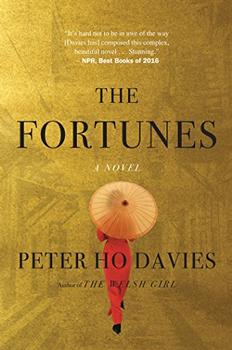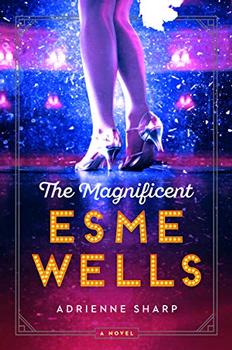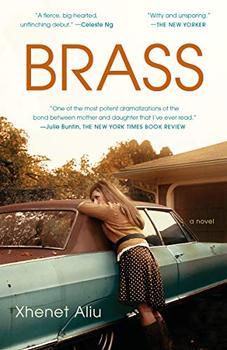Summary | Excerpt | Reviews | Beyond the book | Read-Alikes | Genres & Themes | Author Bio

Peter Ho Davies is a Welsh-Chinese author of two short story collections and one previous novel, The Welsh Girl. The Fortunes, formed of four subtly linked novellas, considers the lives of Chinese immigrants and future generations of Chinese-Americans – especially the prejudice they experience and the difficulty they have in navigating between two divergent cultures.
In the first section, "Gold," Ah Ling works as a valet to railroad baron Charles Crocker in 1860s San Francisco. His mother was Chinese and his father was white – a "ghost." Raised by his Aunty Bao in Hong Kong, where she ran a brothel cum opium den, Ling left for California as a young man. He intends to mine for gold, but instead works in a Chinese laundry doing ironing. Like many Asians of his time, Ling sometimes meets with racism and outright violence. Though his job for Crocker has him dress in Western style, he feels more foreign the longer he is in California.
Real-life actress Anna May Wong is the subject of the second novella, "Silver." As a girl she made deliveries for her father's laundry in Los Angeles and loved escaping into movie theaters. By 1936 she is a genuine movie star in her own right, having appeared opposite the likes of Douglas Fairbanks, but has never seen her parents' native land. So she arranges to sail to China, a journey that will be filmed. Especially with cameras following her, she remarks how Chinese she feels in America, and how American she feels in China – always out of place and having to overcompensate. This novella has a very different style to the historical pastiche of the first; all in the present tense, it's in short sections with evocative titles like "Riveting" and "Darkness, Invisible."
"Jade" is different still: an almost stream-of-consciousness first-person narrative, it's from the perspective of a friend of Vincent Chin, a Chinese-American beaten to death in 1982 by auto workers in Detroit because he was mistaken as Japanese. "Stereotypes cling if they have a little truth; they sting by the same token," our narrator asserts. He tells of Vincent's funeral, the perpetrators' trial, and his friend's transformation into a sort of racial martyr, all the while wallowing in guilt for running away and leaving Vincent to his fate.
The final novella, "Pearl," brings the previous three stories full-circle through the career of John Smith, a half-Chinese academic who's composing a historical novel about the building of the transcontinental railroad. Other writing projects he has put on hold are about Anna May Wong and the Vincent Chin case – presumably these are the "Silver" and "Jade" texts we've already read. He's in Guangzhou now with his wife Nola, about to adopt a little girl from an orphanage (see 'Beyond the Book'). With his ironically generic name – his father was a white pilot who served in the Korean War – John isn't sure whether China is his "mother country" or completely unfamiliar. Like the other main characters, he "couldn't, still can't, choose China or America, wants both, which may be to say neither."
I appreciated the title's connotations of fate and luck, and the way the sections are based around metaphors of precious materials. However, I wasn't always sure how the novellas were meant to fit together; even though the stylistic variety is welcome, it creates some dissonance: these feel like separate documents rather than parts of a coherent whole. Apart from John Smith's planned books and a few recurring elements like laundries, prostitutes, and elephant-themed keepsakes, there's not a whole lot that connects them. I expected some direct links, whether ancestral or otherwise. Also, "Gold" makes for a pretty slow start and takes up a good forty percent of the book. I knew three more stories were to come, and kept waiting to move on.
All the same, The Fortunes as a whole gives a memorable composite picture of the challenges life has posed for generations of Chinese-Americans. It's like a house of many windows; you may prefer the view from one or two more than the others, but they're all necessary to telling the story of the Asian-American experience.
![]() This review was originally published in The BookBrowse Review in September 2016, and has been updated for the
September 2017 edition.
Click here to go to this issue.
This review was originally published in The BookBrowse Review in September 2016, and has been updated for the
September 2017 edition.
Click here to go to this issue.

If you liked The Fortunes, try these:

by Adrienne Sharp
Published 2019
From the nationally bestselling author of The True Memoirs of Little K, a deeply felt and historically detailed novel of family, loss, and love, told by an irrepressible young girl - the daughter of a two-bit gangster and a movie showgirl - growing up in golden-age Hollywood and Las Vegas in its early days.

by Xhenet Aliu
Published 2019
Told in equally gripping parallel narratives with biting wit and grace, Brass announces a fearless new voice with a timely, tender, and quintessentially American story.
Your guide toexceptional books
BookBrowse seeks out and recommends the best in contemporary fiction and nonfiction—books that not only engage and entertain but also deepen our understanding of ourselves and the world around us.